|
|
|
|
On the face of things, most businesses in the travel industry now display some sort of environmental concern. Most tour operators profess their environmentalism, implicitly and explicitly, by offering tours or adventure activities in natural areas such as nature reserves and national parks — especially in developing countries — on the basis that tourism would provide an incentive for locals to make money from protecting landscapes, as opposed to destructive activities such as logging, fish farming, poaching or mining. Many resorts on the other hand are all falling over themselves to prove their green credentials; they devise ways to minimize waste and electricity, and many upscale resorts now levy a dollar or two for every guest's night stay and donate it for environmental programs. I research these efforts all the time as a travel writer specializing in outdoor travel to natural areas...
Read more...
|
|
|
|
|
Traveling responsibly encompasses many different aspects. It involves respect for local cultures and customs, minimizing our impact on local ecosystems, and helping to preserve endangered ecosystems such as the Amazon rainforest. During my extensive travels, I have confronted one issue that affects almost every country and every ecosystem on our planet: no matter what continent you visit or where you chose to travel, there are dozens of plant and animal species threatened by extinction.
Today we are confronted with a mass extinction of species that is unprecedented in the recent history of our planet...
Read more...
|
|
|
|
|
Settling back into "normal life" is always difficult after a long trip, so upon returning from a lengthy stint in Asia I decided a rummage through the random knick knacks collected en route might diffuse post-travel blues. A variety of emotions ensued-joy at the sight of cheesy snaps, mild embarrassment at the clothes which looked so good in India, and bewilderment as to why I had kept bus tickets in a language so foreign it could not even be deciphered where the journeys had begun or ended. But it was not until I opened long unseen thank you cards from recent English students that I felt truly moved...
Read more...
|
|
|
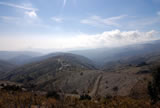
|
...Our flirtation with the idea [to experience rural life in Europe] started when we stumbled on the website for WWOOF or World Wide Opportunities on Organic Farms, the organization that matches volunteers with organic farms around the world. We quickly scanned the front page. A few hours of work each day in exchange for food and lodging? Learn about organic farming and sustainable agriculture while conserving our travel budget? That seemed perfect...
Read more...
|
|
|
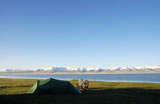
|
...As a general guideline, be discreet, practice low-impact camping techniques and avoid putting your tent anywhere you see the land is fenced off, marked with "no trespassing" signs or being used for farming. As long as you choose a hidden spot, with no obvious signs of ownership, and respect the land you are on by not starting fires and carrying out all your litter, it is very unlikely you will be bothered...
Read more...
|
|
|
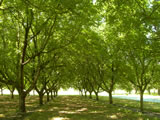
|
Although many French people have become influenced by the global trend towards mass-production and live off of frozen and canned edibles during the week, that does not mean that they have buried their culinary roots in the soil for good. Neon-lit hypermarkets and multi-level parking garages have cropped up across the French countryside. Not all meals linger over two or three hours. But the French do still truly appreciate a carefully prepared meal made from fresh ingredients. The idea of terroir — locally produced ingredients or products — has become popular again, as much with older generations who only ate simple cuisine du terroir in their youth as with the young adults, seeking an alternative to open-heat-serve cooking...
Read more...
|
|
|
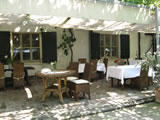
|
Sitting on the balcony of my little Bologna apartment and looking across to a sunny green courtyard while swirling and sipping a glass of velvety Pinot Noir from the Alto-Adige, I cannot help but think fondly of my dear friends Nadia and Paolo, Bolognese born and bred, who gave me this wine as a gift. I met Nadia at the gym. When she learned I that was an American university student on an exchange, she suggested giving her private ESL lessons twice a week. She and her husband Paolo travel outside of Italy often and English comes in handy. Our lessons, long informal conversations that include as much Italian as they do English, often turn to food, and so our friendship began...
Read more...
|
|
|
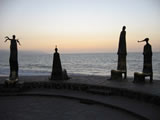
|
...Everyday Mexico, with its beauty and contradictions, nips at the edges of Puerto Vallarta, and it is hard to ignore. That night in the Centro, I wandered narrow cobble-stoned streets and found remnants of the sleepy fishing village Puerto Vallarta once was. This place felt unexpectedly complicated, and I wanted to know more...
Read more...
|
|
|
|
|
|
Travelers are often lured to foreign destinations by exquisite wildlife shots such as stampeding elephants or pouncing lions. As beautiful as these photographs are, they are also quite intimidating for amateur photographers. But I have found that with decent photo equipment, a little bit of practice, patience, and luck, amateurs can also take great pictures of wildlife and animals during their travels...
Read more...
|
|
|
|
|
|
2008 was the 25th anniversary of ecotourism, a word first coined by Mexican architect Hector Ceballos-Lascurain in July 1983. A quarter century later and ecotourism is being developed in practically every country around the world, albeit at different levels and with varying degrees of success. One of the chief obstacles is that ecotourism is simply not defined or interpreted the same way. What Europeans call "a walk in the country" is interpreted as "ecotourism" in Latin America. Far too often the terms used to define tourism are blunt instruments which undermine diversity. Ron Mader shows how travelers can distinguish style and substance and find the trip that creates a mutually beneficial experience for you and the people and places you visit...
Read more...
|
|
|
|
|
|
I confess to having rather a soft spot for the word voluntourism because I appear to have been the first journalist to coin the word in print. I did this in a feature article I wrote the 1990s on the subject of volunteer vacationing suitable for older travelers, citing some of the earliest players in the fledgling field. These included Earthwatch, Habitat for Humanity, and Global Citizens Network — all of which remain steadfast short-term voluntourism models to this day. With an explosion of client interest in recent years and many new variations coming on the market, let us reflect on this worthy marriage of volunteer service and vacation travel...
Read more...
|
|
|
|
|
|
I step on the gas pedal and whip through the streets of Reykjavik, in a rental car that makes me feel far less guilty than usual. This one is a hydrogen-powered Toyota Prius hybrid. I can't help but think this seems perfectly natural. The car is quiet and nothing comes out of the tailpipe, but it drives just like a regular little car. Later I visit a filling station. There are gas pumps, a methane "biogas" pump for the city's garbage trucks, and a hydrogen pump for cars like these...
Read more...
|
|
|
|
|
|
When you are living somewhere for the short to medium term (be it as a volunteer, wwoofer, or gap year traveler), it can be difficult and onerous to integrate into the local community. Either the locals are not interested in folks who are for all intents and purposes "passing through," or you cannot be bothered with the effort of making friends and becoming an integral part of a society you will eventually be leaving. Either way, you are cheating yourself of one of the prime (and most rewarding) reasons for long-term travel: to learn what makes a culture tick and get a finger on the pulse of that society's undercurrent...
Read more...
|
|
|
|
|
|
The Slow Food movement, while invented in Italy, is ideally implicit in everyday life in France. Any conscientious foodie with a love for traditional cuisine can find bliss there. Not any foodie can indulge in an authentic food experience properly while on a budget, however. But that does not mean that it is as challenging as it sounds. Some of the precepts of the Slow Food movement fit perfectly within a budget approach to eating while in France, such as buying local food and going closer to the food source in rural, agricultural areas...
Read more...
|
|
|
|
We are proud to launch TAzine as a monthly Webzine which continues the 31-year tradition started by Transitions Abroad magazine. TAzine features many of the same columnists who wrote for the magazine, a growing group of new columnists, while featuring many freelance writers who wish to share their experiences and expertise within the context of our innovative alternative coverage of work, study, travel, and living abroad.
Founded in 1977 by Dr. Clayton Allen Hubbs, Transitions Abroad magazine was the only print publication dedicated to work, study, living, volunteering, and immersion travel abroad. Its purpose — in print and now as a Webzine — is the dissemination of practical information leading to a greater understanding of other cultures through direct participation in the daily life of the host community.
|
Current Issue and Focus
Ecotourism and Responsible Travel
|
Previous Issue and Focus
Off-Season and Budget Travel
|
|
|
|
|
To view all TAzine back issues, see our archive.
|
|
|
|
